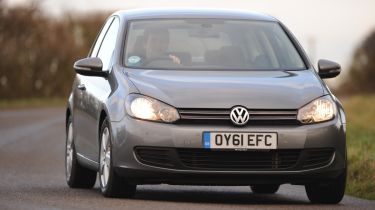VW Golf
Our class champ won’t give up its crown without a fight
As with the Civic, the Volkswagen Golf has a heritage that stretches back more than three decades. But while Honda’s family hatch has taken many style directions through the years, the Golf has followed a far more evolutionary path.
It has become an instantly recognisable benchmark in this market. Its solid, classless looks are the polar opposite of the Honda’s unusual shapes and sharp angles. And while it seems a bit sensible, it’s unquestionably smart, well proportioned and nicely detailed. Even in mid-spec Match trim it looks upmarket.
This premium feel doesn’t come at the expense of day-to-day practicality, though. Our pictures show a three-door version, but in the five-door tested, interior space is a big strength. There’s plenty of rear legroom and better headroom than in the Honda, although the bulky floor tunnel is a little intrusive. Plus, while the 350-litre boot trails the Civic’s for space, it has a wide opening and is more useful than the Focus’ shallow boot.
However, what really separates the Golf from its rivals is the simplicity of the driving environment. While the two-tier Honda dash is an acquired taste and the button-heavy Focus layout overwhelming, VW’s straightforward approach is refreshingly easy to live with.
Used - available now

2023 Honda
Jazz
8,359 milesAutomaticPetrol1.5L
Cash £16,995
2023 Ford
Kuga
21,659 milesAutomaticPetrol2.5L
Cash £21,697
2023 Skoda
Kamiq
17,635 milesManualPetrol1.5L
Cash £15,197
2021 MINI
Cooper Electric
24,423 milesAutomaticElectric
Cash £12,697Better still, the fit and finish inside is faultless and the deep-set dials and subtle backlighting are classy touches. There’s plenty of steering wheel and seat adjustment and the driving position is excellent, plus you get loads of stowage for odds and ends, with big, carpet-lined door pockets, twin cup-holders and a large glovebox.
On the road, the 2.0-litre TDI engine has a punchy delivery and a broad spread of power. The Golf was slowest from 0-60mph, recording a time of 9.8 seconds, but proved a close match for the Focus during our in-gear tests. Real differences only emerge in sixth, where the VW’s long, eco-optimised gearing blunts responses.
Even though it delivers 30Nm less torque than the Honda, at 320Nm, the Golf is noticeably more responsive. Plus, the engine is more refined than the Civic’s.
Road noise is well isolated from the cabin, while the composed chassis and taut suspension set-up deliver a comfortable ride and excellent body control. In corners there’s plenty of grip, and vice-free handling makes the Golf reassuring and relaxing to drive. Plus, all the controls are well weighted and help the car communicate feedback better than the Civic.
Our 2.0-litre TDI BlueMotion Technology model has stop-start, and emits 4g/km more than the Honda, at 114g/km. But both cars sit in the same company car tax band and we averaged 43.5mpg in the Golf.
Private buyers will take heart from the VW’s strong residual values, and the non BlueMotion Tech model, which is £410 cheaper than the car tested here, but has CO2 emissions of 126g/km.
Match trim comes with a multifunction steering wheel, cruise control and Bluetooth – it’s closely matched to the Honda. So the Golf puts up a stout defence of its crown.
Details
Chart position: 1
WHY: The Golf is our current class favourite and the car Honda’s engineers used as a benchmark for quality and refinement.






